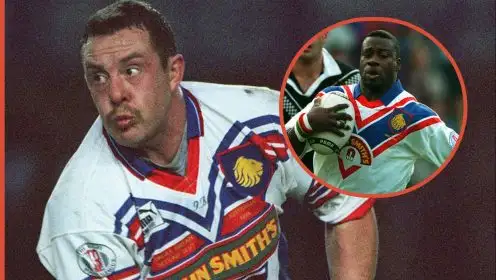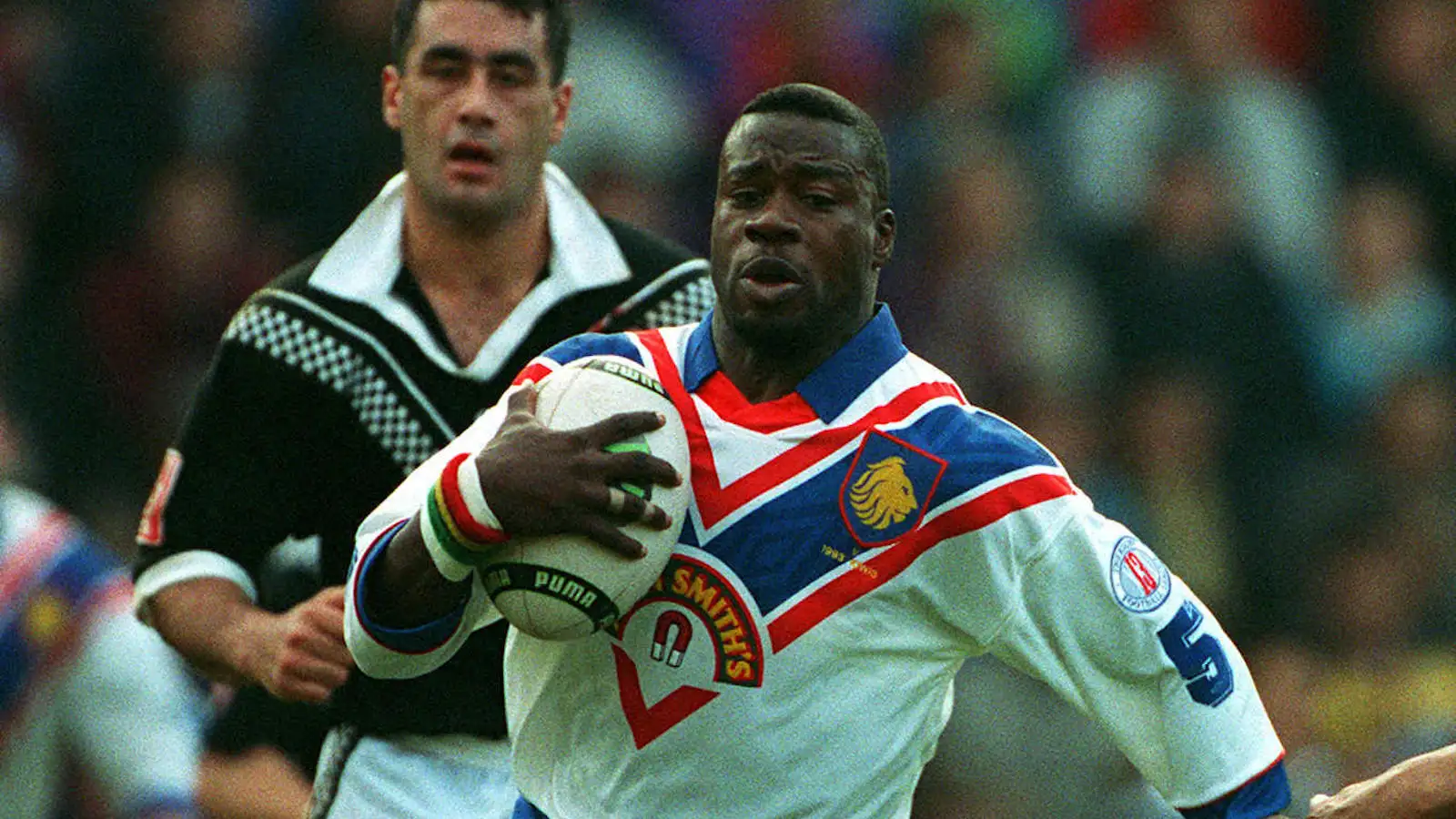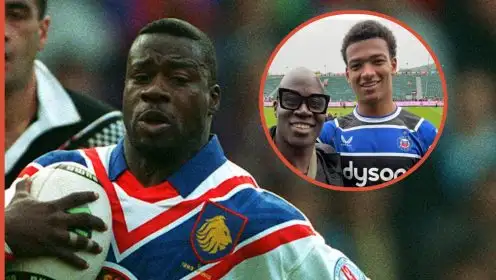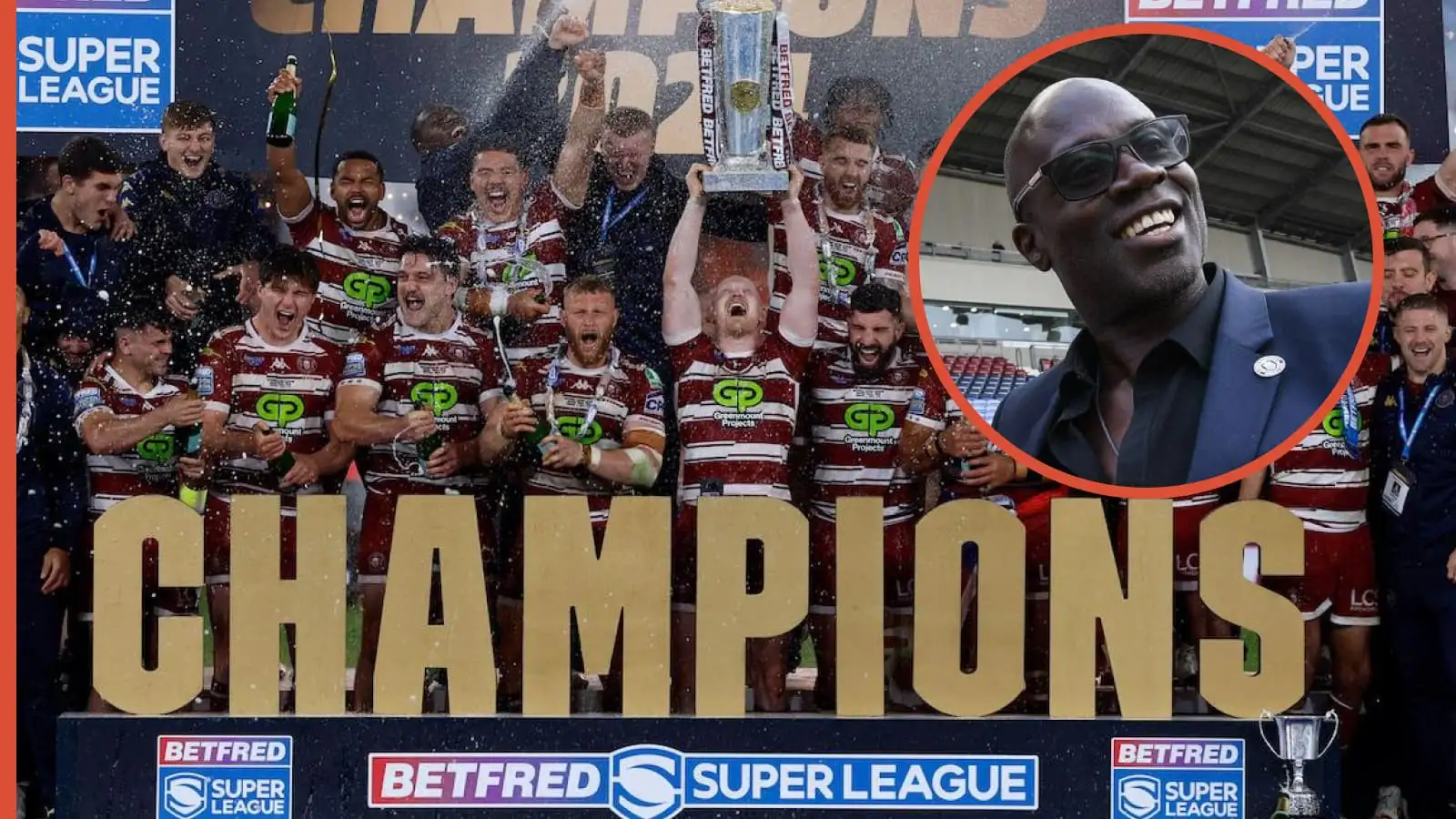Five former players represented in Wembley statue
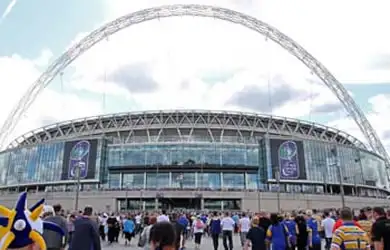
Five of rugby league’s greatest heroes will be represented in the statue which will celebrate the sport’s long and proud association with Wembley Stadium.
The public work of art at Wembley will incorporate the five players who featured in the final shortlist: Billy Boston, Eric Ashton, Martin Offiah, Gus Risman and Alex Murphy.
All five were shortlisted following a public vote and a process involving a number of specially-convened selection panels comprising fans, Rugby League journalists, coaches, players, national newspaper editors and MPs.
The final decision to involve all five players in an artistic interpretation which captures the spirit of Rugby League at Wembley was made by the RFL Board of Directors and announced at the national stadium today.
RFL Chief Executive Nigel Wood said the Board believed the group representation would be the perfect way to highlight the sport’s glorious association and celebrated history with Wembley Stadium.
“The RFL Board’s view echoed that of the many thousands of people who were involved in the selection process in that the statue needed to be a group representation,” said Wood
“So many players have contributed to the rich history of the sport and its association with Wembley and the Board were keen that that should be reflected in the statue.
“Having Risman, Boston, Ashton, Murphy and Offiah all part of the statue means that every generation of the sport is celebrated.
“We will continue the theme of representing the whole sport and its achievements by using the plinth on which the statue will stand as creatively as possible.”
Rugby League is the second sport to be recognised at Wembley alongside football legend Bobby Moore, the captain of the winning England team from the 1966 World Cup final whose statue is the only other work of public art at the stadium.
The sculpture will be commissioned with a view to unveiling it at Wembley prior to the Rugby League World Cup 2013 semi-final double-header at the stadium next November.
Rugby League has been associated with Wembley for over 80 years with the first Challenge Cup final played at the stadium in 1929. Since then some of the sport’s greatest moments have taken place at the venue, including Martin Offiah’s stunning length-of-the-field dash in 1994 which remains etched into the minds of all who witnessed it.
WNSL Managing Director Roger Maslin said: “Wembley Stadium is inextricably linked with Rugby League and most specifically the Challenge Cup.
“At Wembley Stadium we constantly strive to inspire memories and the players being honoured today have undoubtedly given their supporters and the wider sporting public as a whole plenty of memories to cherish.
“It is a fitting tribute that a statue is to be erected in honour of their endeavours but also highlights the history that Rugby League and Wembley Stadium shares.”
Martin Offiah was shocked to find out that he would have some involvement in the final make-up of the statue.
“I couldn’t believe it when I heard the news, I was in total shock,” he said. “I’ve said from the beginning that I’d be proud to support a Rugby League statue at Wembley, no matter whom or what it was.
“But to know that I will be part of the statue is very special. This sits alongside anything that I achieved in my playing career. I’m immensely proud.”
Alex Murphy, who captained three different sides at the iconic venue and has an unbeaten record at the stadium as both player and coach, was honoured to even be considered for the Rugby League statue, let alone be part of the work of art.
“I was humbled to be in the same list as Risman, Boston, Ashton and Offiah and to be considered for the statue at Wembley,” said Murphy.
“But to have some involvement in the final outcome of the statue is overwhelming and quite emotional for me. Wembley is a very special venue.
“A match at Wembley is the most important in a player’s career, no matter what nationality, you always dream of playing at Wembley. So to have a statue representing the history of Rugby League at the stadium is a great accolade for the sport.”
Offiah, Murphy and Billy Boston all attended today’s announcement with Bev Risman representing his late father Gus and Eric Ashton’s daughters, Michelle Huyton and Beverley Smith, and granddaughter Victoria Smith attending on behalf of their late father and grandfather.
Billy Boston said he was “deeply moved” to learn that his playing exploits with Wigan and Great Britain were to be celebrated in the statue.
“It’s a wonderful honour and privilege. I’m deeply moved that there’s going to be a statue of me outside Wembley alongside Gus, Alex, Martin and Eric and that people will look on us all as they do Bobby Moore,” said Boston, who played six times at Wembley, winning on three occasions.
“There is no finer venue anywhere in the world. It’s a fabulous stadium and it still makes the hairs on the back of my neck stand up every year when I come to watch matches here.”
Billy Boston
Billy Boston was a prolific try-scorer during his career with Wigan and Blackpool Borough, the Welsh flier lit up Wembley on six occasions, winning three Challenge Cups. A member of the RL Hall of Fame, Boston scored 478 tries in 485 games for Wigan.
Eric Ashton
Eric Ashton was the first person to win the Challenge Cup as a captain, coach and chairman, Ashton spent his entire playing career at Wigan, scoring 231 tries and 448 goals in 497 appearances. Three Challenge Cup victories, an Ashes success and a World Cup triumph ensured he cemented his reputation as one of the greatest players in Rugby League history.
Martin Offiah
‘Chariots’ is already celebrated at Wembley with a bar named after him in recognition of the wonder try he scored in the 1994 Challenge Cup final against Leeds, when he brought the stadium to its feet on an 80-metre run. He won four Challenge Cup finals with Wigan and represented Great Britain on 33 occasions.
Gus Risman
Gus Risman spent 27 seasons involved in the sport, steered his beloved Workington Town to victory in the Championship in 1951 and to a famous Challenge Cup victory at Wembley in 1952, becoming the oldest ever Cup winner at the age of 41. During a career with Salford, Workington and Batley, he established career records which place him second in terms of all-time appearances with 873, third in terms of points scored with 4,052 and fifth in terms of goal kicked with 1,678.
Alex Murphy
Alex Murphy captained three different clubs at Wembley – St Helens, Leigh and Warrington – and is still held in high esteem by fans of all three clubs. A precocious talent, Murphy was outstanding for Great Britain, with whom he collected 27 caps.
